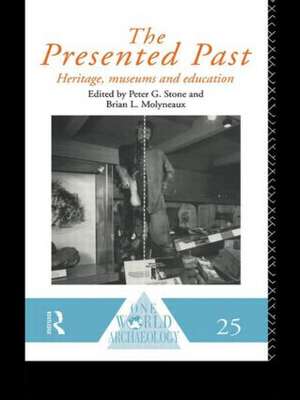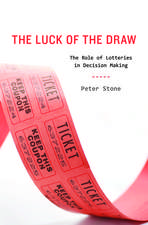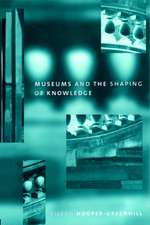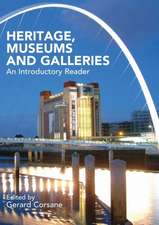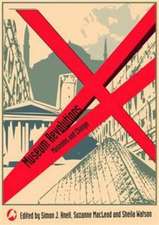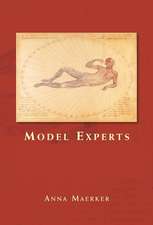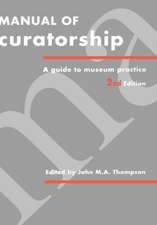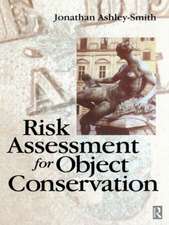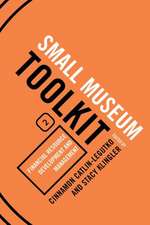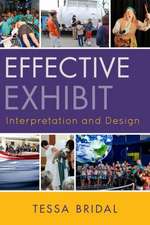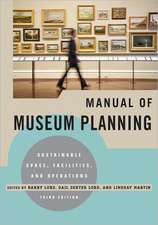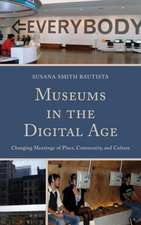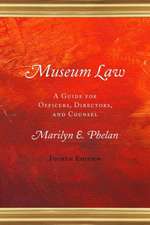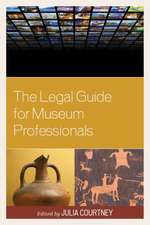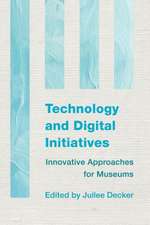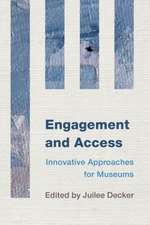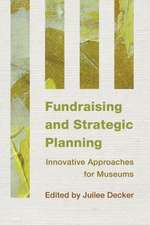The Presented Past: Heritage, Museums and Education: One World Archaeology
Autor B. L. Molyneaux, P. G. Stoneen Limba Engleză Hardback – 13 oct 1994
Central to the book is the belief that the presentation of the past in school curricula and in museum and site interpretations will benefit from a greater use of non-documentary sources derived from archaeological study and oral histories. The book suggests that a view of the past incorporating a larger body of evidence and a wider variety of understanding will help to invigorate the way history is taught. The Presented Past will be of interest to teachers, archaeologists, cultural resource managers, in fact anyone who is concerned with how the past is presented.
| Toate formatele și edițiile | Preț | Express |
|---|---|---|
| Paperback (1) | 429.12 lei 6-8 săpt. | |
| Taylor & Francis – 4 noi 2011 | 429.12 lei 6-8 săpt. | |
| Hardback (1) | 1294.19 lei 6-8 săpt. | |
| Taylor & Francis – 13 oct 1994 | 1294.19 lei 6-8 săpt. |
Din seria One World Archaeology
-
 Preț: 417.17 lei
Preț: 417.17 lei - 8%
 Preț: 383.64 lei
Preț: 383.64 lei -
 Preț: 358.77 lei
Preț: 358.77 lei -
 Preț: 349.50 lei
Preț: 349.50 lei -
 Preț: 230.66 lei
Preț: 230.66 lei -
 Preț: 498.91 lei
Preț: 498.91 lei -
 Preț: 426.67 lei
Preț: 426.67 lei - 12%
 Preț: 336.21 lei
Preț: 336.21 lei -
 Preț: 389.38 lei
Preț: 389.38 lei - 25%
 Preț: 248.97 lei
Preț: 248.97 lei -
 Preț: 461.86 lei
Preț: 461.86 lei -
 Preț: 475.16 lei
Preț: 475.16 lei -
 Preț: 429.12 lei
Preț: 429.12 lei - 20%
 Preț: 114.19 lei
Preț: 114.19 lei -
 Preț: 406.05 lei
Preț: 406.05 lei - 18%
 Preț: 1061.81 lei
Preț: 1061.81 lei - 23%
 Preț: 329.50 lei
Preț: 329.50 lei - 18%
 Preț: 1345.33 lei
Preț: 1345.33 lei -
 Preț: 388.13 lei
Preț: 388.13 lei -
 Preț: 471.08 lei
Preț: 471.08 lei -
 Preț: 390.63 lei
Preț: 390.63 lei - 18%
 Preț: 1002.68 lei
Preț: 1002.68 lei -
 Preț: 511.20 lei
Preț: 511.20 lei -
 Preț: 472.21 lei
Preț: 472.21 lei - 18%
 Preț: 1010.22 lei
Preț: 1010.22 lei -
 Preț: 416.26 lei
Preț: 416.26 lei - 24%
 Preț: 331.04 lei
Preț: 331.04 lei -
 Preț: 494.48 lei
Preț: 494.48 lei -
 Preț: 402.17 lei
Preț: 402.17 lei - 18%
 Preț: 1062.16 lei
Preț: 1062.16 lei -
 Preț: 390.25 lei
Preț: 390.25 lei - 15%
 Preț: 470.69 lei
Preț: 470.69 lei -
 Preț: 476.08 lei
Preț: 476.08 lei - 25%
 Preț: 767.47 lei
Preț: 767.47 lei
Preț: 1294.19 lei
Preț vechi: 1578.28 lei
-18% Nou
Puncte Express: 1941
Preț estimativ în valută:
247.68€ • 257.62$ • 204.47£
247.68€ • 257.62$ • 204.47£
Carte tipărită la comandă
Livrare economică 15-29 aprilie
Preluare comenzi: 021 569.72.76
Specificații
ISBN-13: 9780415096027
ISBN-10: 0415096022
Pagini: 546
Dimensiuni: 156 x 234 x 29 mm
Greutate: 1.08 kg
Ediția:1
Editura: Taylor & Francis
Colecția Routledge
Seria One World Archaeology
Locul publicării:Oxford, United Kingdom
ISBN-10: 0415096022
Pagini: 546
Dimensiuni: 156 x 234 x 29 mm
Greutate: 1.08 kg
Ediția:1
Editura: Taylor & Francis
Colecția Routledge
Seria One World Archaeology
Locul publicării:Oxford, United Kingdom
Cuprins
Introduction: the represented past, BRIAN L. MOLYNEAUX; Chapter 02 Introduction: a framework for discussion, PETER G. STONE; Chapter 1 Reaping the whirlwind: the Reader's Digest Illustrated History of South Africa and changing popular perceptions of history, LESLIE WITZ, CAROLYN HAMILTON; Chapter 2 Archaeology and education in Botswana, DAVID KIYAGA-MULINDWA, ALINAH KELO SEGOBYE; Chapter 3 Presenting archaeology to the public in the USA, FRANCIS P. MCMANAMON; Chapter 4 Public education and archaeology in Florida, USA: an overview and case study, NANCY MARIE WHITE, J.RAYMOND WILLIAMS; Chapter 5 Archaeology and the public in Lebanon: developments since 1986, HELGA SEEDEN; Chapter 6 Education as a means of protection of the archaeological heritage in the districts of Buenos Aires Province, Argentina, FERNANDO OLIVA; Chapter 7 Rescuing ordinary people's culture: museums, material culture and education in Brazil, PEDRO PAULO A. FUNARI; Chapter 8 The role of archaeology in marginalized areas of social conflict: research in the Middle Magdalena region, Colombia, CARLOS EDUARDO LÓPEZ, MARGARITA REYES; Chapter 9 The museum comes to school in Colombia: teaching packages as a method of learning, IVONNE DELGADO CERÓN, CLARA ISABEL MZ-RECAMAN; Chapter 10 The Colegio Nueva Granada Archaeological Museum, Colombia: a proposal for the development of educational museums in schools, EMILIA MORENO DE GIRALDO; Chapter 11 Creative workshops: a teaching method in Colombian museums, ROBERTO RESTREPO RAMÍREZ; Chapter 12 'The Fascinating World of Stonehenge': an exhibition and its aftermath, RUUD BORMAN; Chapter 13 The re-display of the Alexander Keiller Museum, Avebury, and the National Curriculum in England, PETER G. STONE; Chapter 14 Privacy and community through medieval material culture, PHILIPPE G. PLANEL; Chapter 15 What is the public's perception of museum visiting in Poland?, ANDREZEJ MIKOLAJCZYK; Chapter 16 Museums and their messages: the display of the pre- and early colonial past
Descriere
The Presented Past challenges the representation of the past as objective and argues rather that it is `constructed'. This book will interest teachers, archaeologists and cultural resource managers.
